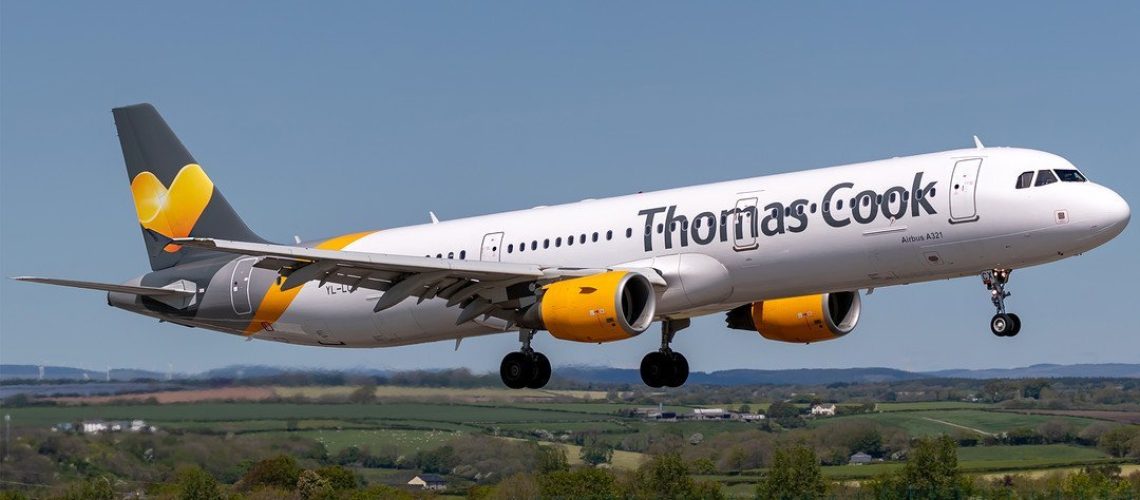Sat at Dalaman Airport yesterday evening on the way home from a holiday there were a few other flights due out including two Thomas Cook flights. The one to Newcastle, timed at 1.30 am this morning was showing as “on time” – no delays, the other at around 4.30am was even the evening before showing as “Delayed”. For me, before the formal announcement was made really spelt out the sorry end to the challenges that culminated over the weekend and the imminent announcements that were due in the early hours.
Sure enough, the Newcastle flight made it out with Thomas Cook officially claiming insolvency whilst they were in the air and was one of the last Thomas Cook flights to land – the other, to London Gatwick as part of today’s repatriation efforts after the announcements around 2.00am.
The impact on employees and holidaymakers is undisputable. LinkedIn has been full of people that had given their life to Thomas Cook and the news full of people who can no longer see family or friends or even get married with huge amounts of money paid to Thomas Cook for those arrangements.
There will be a ripple effect through other supporting businesses, from hotels to inflight catering, from aircraft engineering to IT – the employees and holidaymakers are only part of the knock-on effects of this failure. It is likely the indirect employees affected may well number the same as those directly affected… maybe even more.
If you ever needed reminding that in the travel sector, no one is too big to fail the failure of Thomas Cook is an absolute reminder of this.
How does this impact the card payments sector?
You probably would have seen during the weekend that Thomas Cook was asking card acquirers for the £50m it was held to be released back to their cash flow. This feels like a big number – it isn’t. It isn’t even going to come close to the losses card acquirers will see as a result of chargebacks.
For those not in the sector, as an acquirer in the travel sector your biggest risk factor is unflown revenue in the case of flights (i.e. the full payment for a flight received that has not yet been taken) and deposits for holidays – those deposits increasing to full balances typically 60 days before the holiday is taken.
These are part of your chargeback risk. There is also risk from those who took the holiday, decided within the chargeback window that something was wrong with that holiday and now look to initiate some type of chargeback – in the absence of support staff to support those claims within Thomas Cook this risk here will also be on the up and up.
For those of you who don’t know, the acquiring bank that processes card payments for one of their merchants are essentially underwriting their chargeback risk in the event that business fails – they are essentially giving all of those consumers the money back for their flights and holidays when a chargeback is initiated.
Thomas Cook was a £10bn business. Whilst, not all businesses have closed (given the Insolvency Service has no jurisdiction outside the UK) and not all aspects of their revenue is linked to flight or holiday revenue (and certain underlying providers are honouring bookings) the biggest part inevitably will be. It would not be unrealistic, even at the end of the Summer to expect the chargeback risk to be upwards of £500m. It’s eye-watering.
That will be split across multiple acquirers into multiple regions but rest assured, even divided, there will be many an acquirer taking a very cold bath today and preparing for the inevitable pain.
In a sector where the risk is increasingly outweighing the reward, you must question what appetite you could have within that sector longer-term?
This will be the knock-on impact;
Massively decreased appetite to risk in the travel sector
Every risk department in every acquirer even before the failure of Thomas Cook was looking at their travel merchant base thinking of ways they could mitigate the risk of their existing book with other failures (all be it on a smaller scale) over the past couple of years. The obvious way to mitigate it going forward is to simply not board travel at all or be so very selective on those you do board you almost aren’t boarding any – it still doesn’t solve the issue looking back though at the existing customer/merchant base.
Here’s the reality, if you board a business a similar size to Thomas Cook – you do a deal that looks like a blended average of say 1% (it will be less than this in reality) and your margin is 0.5%, you process £10bn over the year and the rolling liability is £500m. You have inherited £500m of potential liability for £50m of margin PA. Even in GCSE business studies, you are educated about good business being risk vs. reward. If a sectors risk is on the up and up, how do you control your liability in that sector and where do you find the reward? The answer is if there is a failure or risk of failure, you don’t.
Reviewing of existing merchant relationships
The travel sector is more than just tour operators like Thomas Cook it is all the businesses that depended on them to assemble their packages. They too will be feeling the pain of their demise, they are part of the “ripple effect” and it may well take some of them down as well. As an acquirer, your risk is everyone in that ripple effect as well as the sector as a whole. Looking at your back book and ways to mitigate risk I wouldn’t be surprized if those in the travel sector see further conditions placed upon them, that typically might look like;
-
Increased security deposits held by the acquirer – i.e. a request for a security deposit or an increased deposit over and above what is being held currently
-
Deferred settlement – i.e. money held on to by the acquirer for longer before being released to the merchant
-
Rolling reserves – i.e. a percentage of the money processed held for a period of time as security before being released to the merchant i.e. 20% for 120 days




